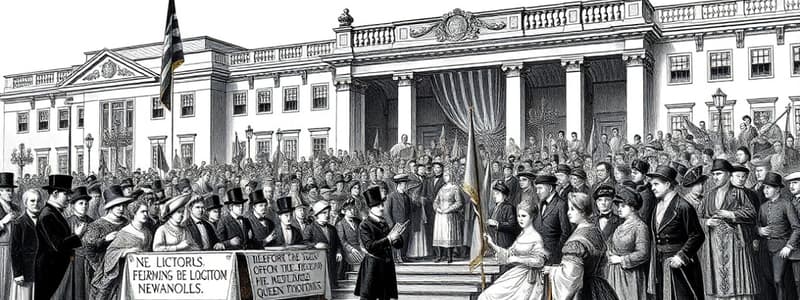Podcast
Questions and Answers
What political shift occurred in England during the 19th century?
What political shift occurred in England during the 19th century?
- Reduction of political parties
- Transition from democracy to aristocracy
- Movement towards a more democratic system (correct)
- End of Queen Victoria's reign
Which industry experienced significant growth during the Industrial Revolution in England?
Which industry experienced significant growth during the Industrial Revolution in England?
- Agriculture
- Telecommunications
- Information technology
- Textile industry (correct)
Which invention was crucial for powering machinery during the Industrial Revolution?
Which invention was crucial for powering machinery during the Industrial Revolution?
- Electric motor
- Steam engine (correct)
- Internal combustion engine
- Wind turbine
What was one of the main demands of the growing industrial working class?
What was one of the main demands of the growing industrial working class?
What did the Factory Acts aim to address?
What did the Factory Acts aim to address?
During the 19th century, the British Empire expanded primarily for what reason?
During the 19th century, the British Empire expanded primarily for what reason?
What social issue was addressed by reforms during the 19th century?
What social issue was addressed by reforms during the 19th century?
Which two political parties rose to prominence during the 19th century in England?
Which two political parties rose to prominence during the 19th century in England?
What concept influenced justifications for imperial control in the 19th century?
What concept influenced justifications for imperial control in the 19th century?
Which literary figures are known for their portrayals of Victorian society?
Which literary figures are known for their portrayals of Victorian society?
What was a major factor in England's economic growth during the 19th century?
What was a major factor in England's economic growth during the 19th century?
Which of the following was NOT a new artistic movement developed in the 19th century?
Which of the following was NOT a new artistic movement developed in the 19th century?
What characterized the economic conditions in 19th century England?
What characterized the economic conditions in 19th century England?
Flashcards
Industrial Revolution in England
Industrial Revolution in England
A period of rapid industrial growth in England during the 19th century, marked by innovations in manufacturing and transportation.
Suffrage
Suffrage
The right to vote, gradually expanded in England through the Reform Acts of the 19th century.
Conservatives
Conservatives
The political party in England that generally supported traditional values and a more limited role for government.
British Imperial Expansion
British Imperial Expansion
Signup and view all the flashcards
Urbanization
Urbanization
Signup and view all the flashcards
Social Reform
Social Reform
Signup and view all the flashcards
Steam Engine
Steam Engine
Signup and view all the flashcards
Victorian Era
Victorian Era
Signup and view all the flashcards
British cultural superiority
British cultural superiority
Signup and view all the flashcards
Economic Growth in 19th Century England
Economic Growth in 19th Century England
Signup and view all the flashcards
Artistic Movements in 19th Century England
Artistic Movements in 19th Century England
Signup and view all the flashcards
Study Notes
Political Landscape
- The 19th century saw significant political shifts in England, moving from a largely aristocratic system to a more democratic one.
- The Reform Acts of 1832, 1867, and 1884 progressively expanded suffrage, giving more people the right to vote.
- This period saw the rise of political parties, including the Conservatives and the Liberals, and the emergence of prominent figures like Benjamin Disraeli and William Gladstone.
- The reign of Queen Victoria encompassed most of the century, symbolizing stability and a period of significant industrial and social change.
- Growing calls for social reform and representation led to increased participation from various social classes.
Industrial Revolution
- England was the epicenter of the Industrial Revolution in the 19th century. Innovations in manufacturing and transportation profoundly reshaped society.
- The textile industry, coal mining, and iron production experienced explosive growth, leading to urbanization and the development of factories.
- The invention of the steam engine was crucial to powering machinery and transportation, revolutionizing aspects of daily life.
- New infrastructure, including canals, railways, and roads, facilitated trade and economic growth.
- This rapid industrialization led to significant social and economic disparities, with new wealth alongside poverty and poor working conditions amongst the working class.
Social Reforms
- The growing industrial working class demanded changes in working conditions, housing, and education.
- This spurred various social reforms addressing issues like child labor, poor sanitation, and limited access to education.
- Acts like the Factory Acts aimed to regulate working hours and improve factory safety.
- Improvements in public health and sanitation were enacted to combat widespread disease and poverty.
- Efforts to expand access to education were made, though inequalities persisted.
Empire and Expansion
- The British Empire reached its zenith in the 19th century. Imperial expansion continued across the globe, acquiring vast territories in Asia, Africa, and the Americas.
- The quest for resources, strategic advantages, and the propagation of British influence fueled colonial expansion.
- Interactions with other cultures and populations yielded both economic benefits and social conflicts.
- Increased trade and access to new markets propelled Britain's economic dominance.
- The notion of British cultural superiority and the "White Man's Burden" influenced justifications for imperial control.
Culture and Arts
- The 19th century fostered a wealth of literary, artistic, and scientific achievements.
- Authors like Charles Dickens, Jane Austen, and the Brontë sisters offered insightful portrayals of Victorian society.
- The arts reflected social changes and anxieties of the age, encompassing realism, romanticism, and other movements.
- Scientific advancements, particularly in physics and biology, advanced understanding of the natural world.
- New artistic movements like Romanticism, Realism, and Impressionism developed.
Economic Conditions
- England experienced substantial economic growth, fueled by industrialization and its position as a global trade power.
- The development of a global financial system centered in London, making it the largest and most prominent financial center globally.
- Major fluctuations and economic depressions punctuated the century, affecting diverse segments of society.
- The expansion of markets, both domestically and internationally, fueled trade, enabling substantial industrial growth.
- New economic powers emerged on the world stage.
Studying That Suits You
Use AI to generate personalized quizzes and flashcards to suit your learning preferences.




